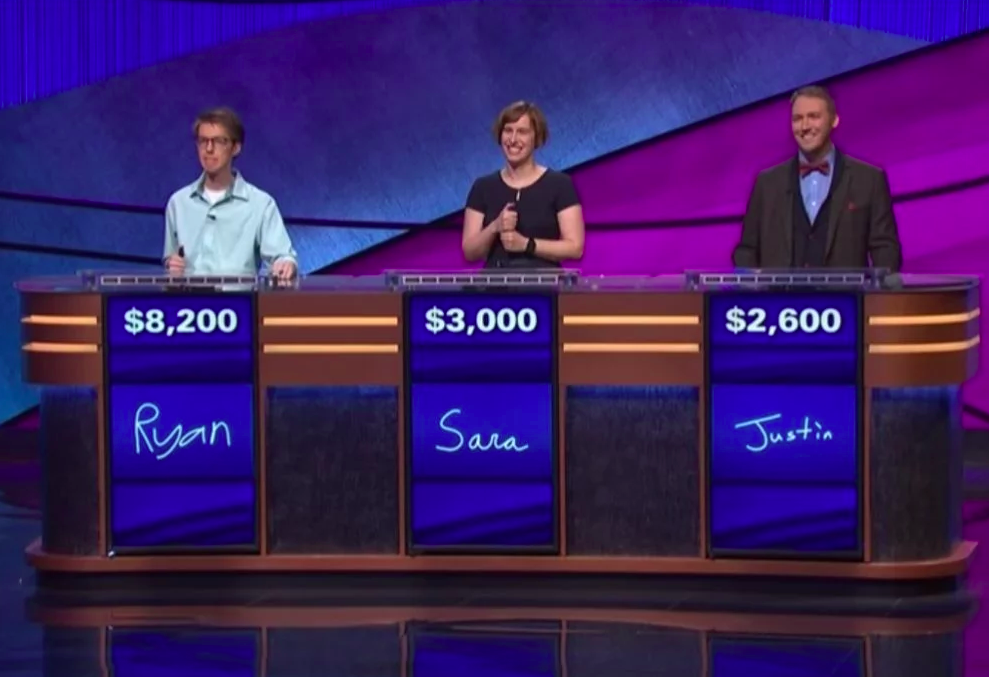Why the Runners’ Up Prizes Aren’t in Jeopardy

Pictured above are three contestants on the TV game show, Jeopardy!. If you’re not familiar with the rules of the show, it’s pretty simple: contestants are given trivia questions (in the form of statements) and have to answer them (in the form of questions). Depending on the round, questions can be worth as little as $200 and as much as $2,000, some exceptions notwithstanding. Get the question right, you get that amount credited to your account; get it wrong, that amount is deducted. The last question — Final Jeopardy! — works a bit differently; the contestants are given a category and asked to wager some amount of their earnings before seeing the question. Again, if they get it right, that amount gets added; get it wrong, and it’s subtracted.
In the end, though, only the winning player’s amount matters. He or she gets to take that amount of money home and is invited back to the next game’s show. The runners-up don’t. They, instead, get consolation prizes: $2,000 for the second-place finisher and $1,000 for third place.
But that wasn’t always the case. Before 1984, runners-up took home whatever they earned during gameplay. Why the change? It has to do, originally, with a man who wanted to propose to his girlfriend.
The story starts in the 1960s when the show was aired during the day (and wasn’t yet iconic). According to The Jeopardy! Book (written by the show’s current host, Alex Trebek, and published in 1990), contestants were often playing very cautiously. Instead of playing to win, they were playing it safe and protecting the cash they earned in early rounds. In 1967, for example, one contestant came on the show with “the express purpose of winning enough money to buy an engagement ring,” per the book. Trebek and co-author Peter Barsocchini continue: “He won a sufficient amount for the ring midway through the game and kept his mouth shut from there on.” Good for him, but bad for the show: no action makes for boring television.
When the show rebooted in the 1980s as a primetime mainstay, having players drop out mid-game wasn’t an option. So, the producers came up with a new idea. They decided that you wouldn’t get to keep the money unless you won; therefore, there was no reason to stop playing mid-game. Further, the book notes, this gave laggards some extra incentive to bet the farm in Final Jeopardy; if you can’t take it with you anyway, you may as well risk it all in hopes that the leader makes “a historic blunder.” (That doesn’t happen too often, but it can’t hurt to try.)
In the end, though, the runners-up may end up in the red. The $2,000 and $1,000 prizes are primarily designed to account for the losses incurred by the failed contestants. Originally, the runners-up received various merchandise donated by sponsors, but that seemed inadequate, and in 2002, Jeopardy! switched to cash consolation prizes (sponsored by Geico). That’s a good thing, too; as Wikipedia notes, “the show does not generally provide airfare or lodging for contestants,” therefore, “cash consolation prizes alleviate contestants’ financial burden.”
But one thing hasn’t changed since the 1967 game which precipitated the change. The man who played for that engagement ring played the game right. Again, according to the Jeopardy! Book: “He did, by the way, purchase the ring, marry the girl, and remains married to her twenty-three years later.”
Bonus fact: On occasion, Jeopardy! will air a special set of games — a tournament where the contestants all match a theme, such as their annual Teen Tournament for contestants aged 13 to 17. Every so often, though, the theme is “famous people,” such as in the irregularly scheduled Jeopardy! Power Players’ Tournament. Most recently held in 2016, the tournament featured former CBS News correspondent Lara Logan, CNN anchor Anderson Cooper, best-selling author Jonathan Franzen, and a dozen others, all playing for charity. The episodes lasted a week, but it’s not realistic to have influencers of that caliber give up an entire week for filming. The workaround? The Atlantic spills the beans: “the team behind the show is an exceptionally well-oiled machine, filming the five episodes of the tournament—which air from Monday to Friday [ . . . ] —on a single Saturday. (To maintain the illusion of time passing, Trebek changes his suit in between each game. When questioned, he concedes that he owns about a hundred.)”
From the Archives: Judging Jeopardy!: Every once in a while, Alex Trebek will return from a commercial break and announce that the judges — whoever they are — have reviewed the gameplay and corrected an error. Here’s what’s happening during that intermission.
